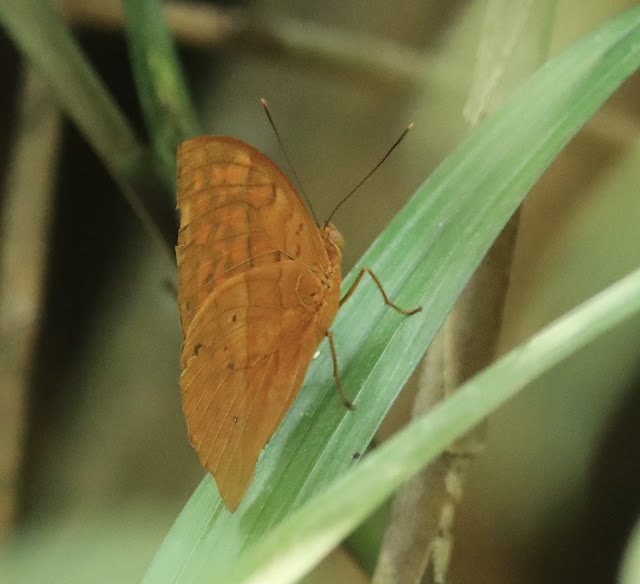Genting is well known for its resort and theme parks. A very commercialise place with only a few small pockets of forest remaining for nature lovers. Nevertheless there are still some interesting montane butterflies which you can't get to see them in lowlands. Here are just a few of them.
Taraka hamada mendesia
A small butterfly with hairy legs.
Forest Pierrot
Taraka hamada mendesia
Apparently this species can also be found as far as India and Japan.
Lesser Pierrot
Taraka mahanetra
This Pierrot can only be found in this region.
Status: rare
Lesser Pierrot
Taraka mahanetra
Looks like a female.
Red Caliph
Enispe duranius corbeti
This one I believe is also a montane / sub-montane species.
Red Caliph
Enispe duranius corbeti
So lucky to see it.
White-banded Oakblue
Arhopala ijanensis
Most of the montane Oakblues are quite rare including this one.
White-banded Oakblue
Arhopala ijanensis
It has a bright bluish upperside.
Powdered Oakblue
Arhopala bazalus bazalus
Tailed Judy
Abisara neophron chelina
This Abisara is only common in sub-montane areas for example from Fraser's Hill upwards (i.e about 1000 meters asl and above).
This Yamfly is common only in hilly or sub-montane areas.
Branded Yamfly
Yasoda pitane laruta
This Yamfly is also a montane specialist.
White-banded Palmfly
Elymnias dara darina
So far I have not seen this Elymnias in lowlands.
Grey Count
Tanaecia lepidea matala
This Tanaecia is more common up on the hills rather than lowlands.
Grey Count
Tanaecia lepidea matala
An underside profile. Very dull looking.
Leopard Lacewing
Cethosia cyane
According to the CP book, this Lacewing is native to India and was only discovered here as latest as in 1997. I have never seen this Lacewing in any lowlands so far.
Leopard Lacewing
Cethosia cyane
I also noticed that Lacewings are quite fond with Latana flowers.
Now we come to some species which can be seen in the highlands as well as lowland areas.
Plain Green Palmer
Pirdana distanti distanti
Status: rare
Striped Green Palmer
Pirdana hyela rudolphii
Status: rare / uncommon
Striped Green Palmer
Pirdana hyela rudolphii
When I first saw this species, it was in one of the lowland trails but apparently it is reportedly more common in the higher elevations.
Detached Dart (edited)
Potanthus trachala tytleri (edited)
Detached Dart (edited)
Potanthus trachala tytleri (edited)
Initially I tot I saw a luzonensis but it turns out to be just a Potanthus.
Malayan Swift
Caltoris malaya
This is my best shot of this skipper.
Malay Forest Bob
Scobura phiditia
This Bob can also be found in lowland areas such as in Hulu Langat.
Large Dart
Potanthus serina
Great Sergeant
Athyma larymna siamensis
My lifer.
Status: rare
Great Sergeant
Athyma larymna siamensis
It's larger than other Athyma.
Plain Lacewing / Orange Lacewing
Cethosia methypsea methypsea
This Lacewing is quite 'famous' in every highlands.
Plain Lacewing / Orange Lacewing
Cethosia methypsea methypsea
Malayan Lacewing
Cethosia hypsea hypsina
I have seen this one in the lowlands as well.
White Tiger / Black-veined Tiger
Danaus chrysippus chrysippus
Another common species in the highlands.
White Tiger / Black-veined Tiger
Danaus chrysippus chrysippus
Occasionally you can also see them in the lowlands.
Smaller Wood-Nymph
Ideopsis gaura perakana
You can see them quite often in the hilly areas.
Ragadia makuta siponta
This species can also be found in lowlands but they are more common in higher hills.
Malayan Snow Flat
Tagiades calligana
I did not manage to see many Flats during my visits.
Tagiades japetus
This Flat was seen at the trail head.
Blue Germ
Poritia erycinoides phraatica
Male
Blue Germ
Poritia erycinoides phraatica
Female
Blue Germ
Poritia erycinoides phraatica
Occasionally you can see this Gem in lowlands too.
Simiskina pheretia
This Simiskina is the most common one you will get to see in the highlands. Elsewhere I believe it should be uncommon.
Another lowland species.
Eulacera osteria kumana
Female
Euploea mulciber mulciber
Female.
UNTIL WE MEET AGAIN.
I HOPE TO GET MORE CHANCES TO SEE MORE LIFERS THE NEXT TIME HERE!!














































No comments:
Post a Comment